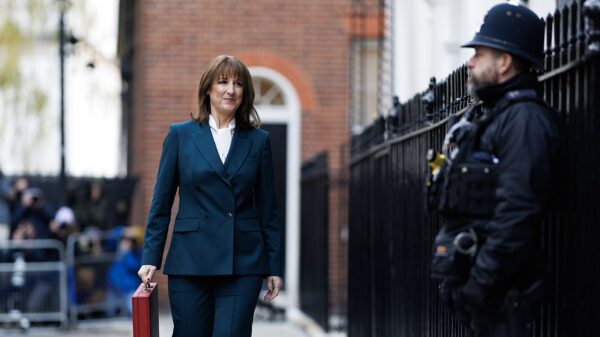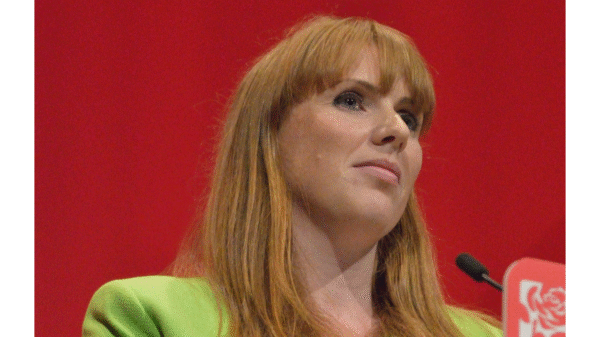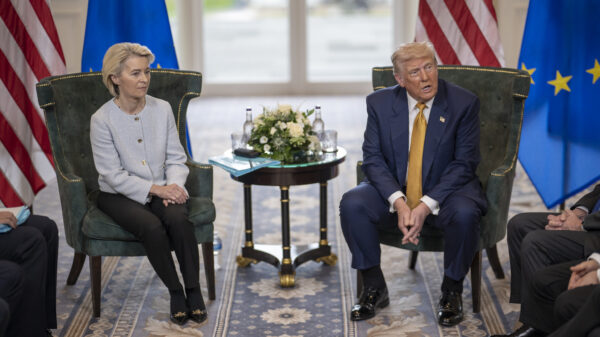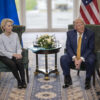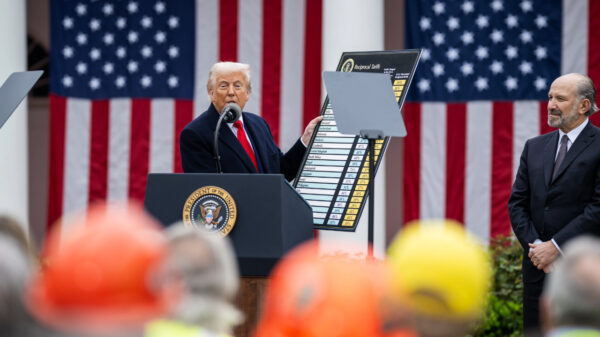Staff Writer Benjamin Aston evaluates Keir Starmer’s foreign policy track record so far.
In yet another success for Prime Minister Sir Keir Starmer, India and the UK have agreed a new trade deal. With new Indian investment and export wins worth almost £6bn, over 2,200 British jobs is expected to be created. It is estimated to add £4.8bn to the UK GDP yearly and increase bilateral trade by 39% in the long-term.
Tariffs on UK exports will be slashed for whisky producers, halving to 75% then dropping further to 40% over the next 10 years. Tariffs on aerospace will be cut from 11% to 0% and automotives up to 110% down to 10% (under a quota). However, car manufacturers have been left disappointed with tariffs remaining between 30- 50% on many petrol and diesel cars, given the lowest 10% tariffs aren’t set to take effect until 2031.
India will also benefit from cuts to UK tariffs imposed on imports from the country. This is expected to reduce UK export tariffs by over £400mn initially, hiking up to £900m after 10 years. By comparison, UK import duties from India would be reduced by around £220m, appearing particularly beneficial to the UK in this aspect. It should also improve trade volume between the countries, as costs are reduced for importers. UK exports to India, in particular, are estimated to increase by nearly 60% in the long run.
A controversial policy of the deal is the modification of the Double Contributions Convention (DCC) that was in place between the UK and India. The modification means Indian employees and employers on short-term transfers to the UK will not pay any contribution for up to three years. This is reciprocated for British workers moving to India under the same conditions. Critics argue that this signals an unfair agreement that could undercut UK workers, but this is far from the case. National Insurance Contributions are only halted for employees working for India-based companies who move to the UK temporarily to continue working for that company. The goal of DCCs is to prevent double contributions to social security schemes, when working abroad. Trade Secretary Jonathan Reynolds has called claims that the DCC will undercut the cost of British workers as “completely false”. Besides, the goal of a DCC, as mentioned, is to prevent double contribution, not to prevent contribution altogether. We should also note that the UK has DCCs in place that mirror this one internationally amongst others.
This follows an impressive ‘trade deal’ with the US, in comparison to other nations like China or the EU. The UK will be at a baseline 10% tariff, compared to an added 30% to China and an all-inclusive 15% ceiling for EU goods. On 8th May 2025, US tariffs fell from 27.5% to 10% where the US will create a 100,000 unit car exports quota. From the 4th of June, the US was expected to double its import tariffs on steel and aluminium to 50%, however the UK was an exception, retaining instead a 25% tariff. Yet, Starmer’s EU counterparts were hit hard with tariffs, forced to sustain the standard 50% tariff on steel and aluminium. According to the government, thousands of jobs for British car makers and the steel industry will be saved, after a landmark economic deal with the US. The steel industry, previously appearing set to collapse, was a particular winner in this deal.
Despite Starmer’s focus on trade, there has been an effort to boost defence cooperation with his EU counterparts. Following French President Emmanuel Macron’s visit to London, Starmer and Macron deepened their commitment to independent nuclear deterrents, retaining that Iran can never have a nuclear weapon. A migrant returns deal was also agreed, with a pilot scheme allowing for the return of 50 illegal migrants who arrived in the UK on small boats back to France, in a “one-in-one” out deal. This is in return for the UK taking on the same number of asylum seekers in France who are deemed to have a legitimate case.
However, criticism regarding the agreement has been plentiful. Amy Pope, Director General of the International Organization for Migration, argued “UK and French co-operation is a positive sign but is not going to the heart of the matter”, according to the Financial Times. Furthermore, Conservatives have been critical, arguing that the deal would only amount to about 5% of those attempting crossing currently. However, the deal acts as a deterrent for both irregular migrants and smuggling gangs and the opportunity to increase the scale of the deal is a promising sign.
The previous Conservative government pushed a plan to deport migrants from the UK to Rwanda, which was found to be unlawful by the UK Supreme Court. This was due to it being open to human rights breaches. According to Home Secretary Yvette Cooper, the plan only four people travelled to Rwanda voluntarily with the Conservatives intending to spend £10bn on the policy. This is in addition to the existing £700m already spent, included £290m of payments to Rwanda. Even if it was ‘effective’, it was a cheap, vulgar attempt by a cruel Conservative government at retribution for the crime of wanting a better life. The Conservatives had even considered emergency legislation to bypass the Supreme Court’s ruling. Obviously, it was scrapped by the Labour government as soon as they were elected.
Reform UK have also been keen to criticise Starmer’s handling of illegal immigration, though their main plain just consists of leaving the European Convention on Human Rights (ECHR). This would allow ministers to tackle illegal migration more effectively. However, the only significant omissions in Europe are Russia and Belarus, thus appearing to be rooted in a hate culture of vulnerable migrants. Furthermore, a 2019 Goldman Sachs study estimated that the UK’s withdrawal from the EU, which Farage championed for, costed the UK £600m per week or over £31bn yearly.
In July, German Chancellor Freidrich Merz visited the UK to attend talks with Starmer, resulting in a mutual-defence pact between the two nations. Officials state it should be made clear that this should not cast doubt on Nato’s Article 5. Starmer also agreed to make it easier for German school trips to be carried out in the UK to mitigate the 80% drop since Brexit. In return, Germany has committed to ramp up action against smuggling gangs and illegal migration; a win for Starmer as he continues to face criticism over his handling of immigration to the UK.
Clearly, Starmer has achieved more than any political party post-Brexit to strengthen ties with the EU and build confidence in the UK economy. Labour have achieved a cut in the Bank of England’s rate of inflation, down to 4% from 5.25%. The FTSE 100 has seen an 11.29% increase in value since Labour’s ascent to power, signifying a growing confidence in UK markets over the past year. This is not a bad return for the Prime Minister, given he inherited a country with broken ties to the EU and an economy saddled with debt from the Conservatives’ reign.
This is not to say that Labour’s foreign policy has been perfect. Starmer remains under pressure regarding the Israel-Palestine war, with a Labour MP demanding for a return of hostages before recognising Palestine. Despite Starmer’s promise to recognise a Palestinian state in September if Israel doesn’t alleviate the suffering, Labour criticism of Israel has overwhelmingly been muted. Macron has already pledged that France will recognise a Palestinian state in September.
Westminster has also been criticised for cutting the foreign aid budget by £6bn, causing Anneliese Dodds to resign from her post as International Development Minister in protest. Funding foreign aid is generally unpopular within the UK, despite the moral and practical implications, with people supporting increased defence spending instead. Nato has since agreed to increase traditional defence spending to 3.5% of GDP, after pressure from Trump. Currently, the UK is committed to increase defence spending to 2.5% from 2027 and 3% by the next election.
Realistically, there has to be compromises regarding domestic spending, defence and aid. Rachel Reeves may face a shortfall of up to £30bn in the Autumn Budget. However, it is also incredibly difficult to justify cutting foreign aid, an instrument vital in protecting the most vulnerable communities around the world. Trump has gained a reputation for failing to follow through with his threats. With Starmer coming out as top dog, Trump’s empty promises leave an empty trail in his presidency.
Germany has also been far more direct with strengthening their defence, through increased budgets and conscription even being considered. France have also been clear about their commitment to protect the EU, with Macron open to deploy French nuclear weapons in Europe. Yet, the UK lacks serious plans on how the increased defence budget will be spent.
Despite this, it is clear that Starmer’s foreign policy has been pragmatic and rooted in building ties with important allies. Stronger ties with the EU on defence, an impressive deal with India, and a deal with the US that achieves the most lenient tariffs of the world demonstrate Starmer’s focus.












